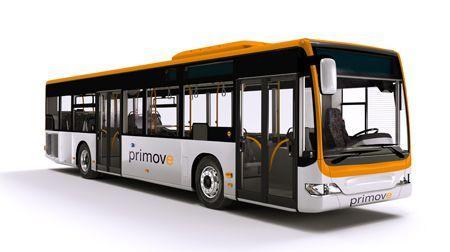
Photo: Electric Bus by Primove Technology
In the field of electrically powered transport innovations are coming thick and fast – unlike the vehicles themselves (in the UK at least) which are still almost as rare as the proverbial “hen’s teeth”.
South Korean road wirelessly recharges OLEV buses
So it is that another new and innovative idea has been put into practice in a small showcase demo in South Korea – where they have switched on a road which can recharge electric vehicles as they drive over it! More details at www.bbc.co.uk/news/technology-23603751.
It is of course very early days with that particular project – and of course the nay sayers are already predicting it’s infeasibility due to cost and so forth. But what it does show is that all over the world people, companies, universities and so on, are trying to find solutions for the generally expected moment when the oil flow can no longer match the demand (leading to ever higher prices, etc).
The system being demonstrated in South Korea uses inductive coils embedded in the road to provide charge for electric vehicles traveling above (the inductive transmission method has been known about for a long time. Basically it is a simple idea – a primary coil sits passively under the road, when it detects a similar coil – in a vehicle above which has been fitted with one – a powerful alternating current is set up in the primary coil, this creates a strong magnetic field which stimulates a current in the coil in the vehicle and energy is transferred, without wires). The major difference with the South Korean system to others under trial elsewhere is that the coils run continuously along the length of the road (thus the cost) rather than being located at occasional and particular points.
In Germany (for instance) in the city of Braunschweig a system is being tested using 3 induction loop charging points on an 8 mile circuit (one bus route). The system is being developed and tested by a partnership of the local bus company, the city, the Technical University of Braunschweig and Bombardier Transportation.
Read more at the Braunschweig University inductive loop project page – www.tu-braunschweig.de/forschung/zentren/nff/projekte/primove/index.html;jsessionid=TRIFORK9394182716
Watch a video of PRIMOVE’s system which provides a contactless power source for all types of electric transport – from light rail and bus networks to commercial vehicles and cars:
The Bombardier developed system being trialled uses their PRIMOVE inductive charging system, which itself is being developed further by replacing some batteries with high density capacitors in a system called MITRAC. The advantage of capacitors is that being electrical (rather than chemical like batteries) they can withstand tens or hundreds of thousands of charge cycles, they also weigh much less than batteries and although they cannot (yet) store as much energy as batteries do this (disadvantage) is obviated when there are inductive loop charging points available on a route.
Read more about PRIMOVE at: primove.bombardier.com
Read more about MITRAC at: www.bombardier.com/en/transportation/products-services/technology-solutions/eco4-technologies/mitrac-energy-saver.html
Could Dorchester’s Electric Bus Route wirelessly charge electric buses?
Perhaps inductive loop charging may be the (or a) coming thing? We shall see. Neil and Judith Forsyth writing in AtoB Magazine June 2013 (Issue 96) – www.atob.org.uk/store – about inductive loop systems (and to whom I am obliged for many of the references here about Bombardiers systems and so forth), suggest in their article that the Poundbury electric bus route could perhaps utilise an inductive loop charge point, perhaps at its railway station end? The route currently requiring two buses (as one is re-charging at the depot while the other is in use) could manage with one, charging at a point in the route, leaving the other bus for a further route. That would make Dorchester (and Dorset) even more leading edge (in the UK context) than it already is. Prince Charles himself was one of those who sought to have electric buses used to serve Poundbury – maybe he might take an interest in this further development of the inductive loop?

